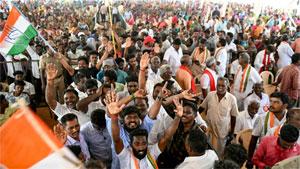19 Apr 2024 - {{hitsCtrl.values.hits}}
 (CNN) - Polls opened Friday for the first and largest phase of India’s marathon general election, kicking off a vote in which Prime Minister Narendra Modi is seeking to win a rare third consecutive term.
(CNN) - Polls opened Friday for the first and largest phase of India’s marathon general election, kicking off a vote in which Prime Minister Narendra Modi is seeking to win a rare third consecutive term.
About 969 million people are eligible to vote in the biggest election in human history, with polling taking place in seven phases over the next six weeks in the world’s most populous country.
The nationwide vote is considered among the most consequential in decades as Modi’s powerful right-wing Bharatiya Janata Party (BJP) aims for an outright majority and a mandate to widen its development and Hindu-nationalist policies established during its 10-year rule.
Those policies have transformed India economically and culturally, and BJP rule has been defined by a pull away from India’s secular foundation, toward Hindu majoritarianism.
Under Modi’s leadership, the country of 1.4 billion people has become the world’s fastest-growing major economy and a modern global power.
The 73-year-old’s transformational rule has been marked by infrastructure and welfare projects, fervent Hindu nationalism, rapid economic expansion and an increasing presence on the world stage.
But it has also been plagued by soaring youth unemployment and inequality, particularly in rural areas, and critics say Modi has driven religious polarization, which has included rising Islamophobia and persecution of the country’s 230 million Muslims.
Still, Modi’s popularity is unparalleled for a two-term incumbent and his rallies have consistently drawn tens of thousands of supporters.
The BJP’s campaign manifesto centers on job creation, anti-poverty programs such as expanding food handouts and housing schemes, and national development with particular focus on women, the poor, farmers and young people.
Modi wants to turn the country into a global manufacturing hub, continue its massive infrastructure transformation, and achieve energy independence by 2047.
On the world stage, Modi wants India to become a permanent member of the United Nations Security Council, will push to bid for the 2036 Summer Olympics and aims to land an astronaut on the moon.
The BJP has also pledged to implement a uniform civil code, which would replace a sprawl of religious and customary laws with a standard rule that everyone, regardless of faith, would be required to follow. The BJP says it will protect the rights of women, though some communities say it will interfere with their freedom of religion and customs.
Challenging the BJP is India’s main opposition party, the Indian National Congress, and its newly formed INDIA alliance of parties.
But the once-formidable force in Indian politics has been languishing since Modi rose to power a decade ago. And the INDIA alliance is already starting to show cracks, with defections and infighting.
The opposition bloc is banking on a unified approach to counter the BJP’s dominance over the past decade.
The Congress party’s campaign is promising “freedom from fear” and vowing to protect democratic values such as freedom of speech, expression and religious belief espoused in the constitution.
Its manifesto also emphasizes justice, equity and welfare, promising recognition of civil unions between LGBTQ+ couples, protection of religious minorities, and safety and empowerment of women, among other pledges such as apprenticeship for young graduates.
It speaks directly to critiques from rights groups that the BJP is eroding democratic values, by promising to restore freedom of the media, to strengthen the autonomy of the Election Commission and other state agencies, and review laws passed by the BJP “without proper parliamentary scrutiny and debate.”
India’s Election Commission has imposed restrictions on media, including CNN, that limits the publication of reporting and analysis in the run-up to and during polling days.
Voters are casting their ballots for 543 seats in the lower house of parliament, or Lok Sabha, with a further two seats nominated by the country’s president.
The party with the majority will form a government and appoint one of its winning candidates as prime minister.
On Friday, voters from constituencies in 21 states and union territories across India will cast their ballots electronically. Some states are so big that voting is spread out over the seven phases, while others vote on one day.
Among the most politically important states is Uttar Pradesh, home to 240 million people who vote in all seven phases. India’s largest state is a crucial battleground with 80 seats in the Lok Sabha up for grabs.
Also voting Friday is the southern state of Tamil Nadu and its capital Chennai, where the regional Dravida Munnetra Kazhagam party and INDIA alliance will be vying to prevent the BJP from making inroads into a corner of India it has historically struggled to penetrate.
West Bengal, a state of 102 million people and 42 Lok Sabha seats, will also vote in all seven phases, starting Friday. The BJP has struggled to crack the state, which has been long ruled by the All India Trinamool Congress and headed by political heavyweight Chief Minister Mamata Banerjee.
The remote Indian Ocean archipelago of the Andaman and Nicobar Islands, home to indigenous tribes from among the world’s most isolated communities, will also vote Friday.
So too will the northeast states, including Mizoram, Meghalaya and Nagaland on the border with Myanmar, as well as parts of Manipur, which has been gripped by ethnic violence over the past year.
25 Dec 2024 3 hours ago
25 Dec 2024 4 hours ago
25 Dec 2024 5 hours ago
25 Dec 2024 6 hours ago
25 Dec 2024 6 hours ago